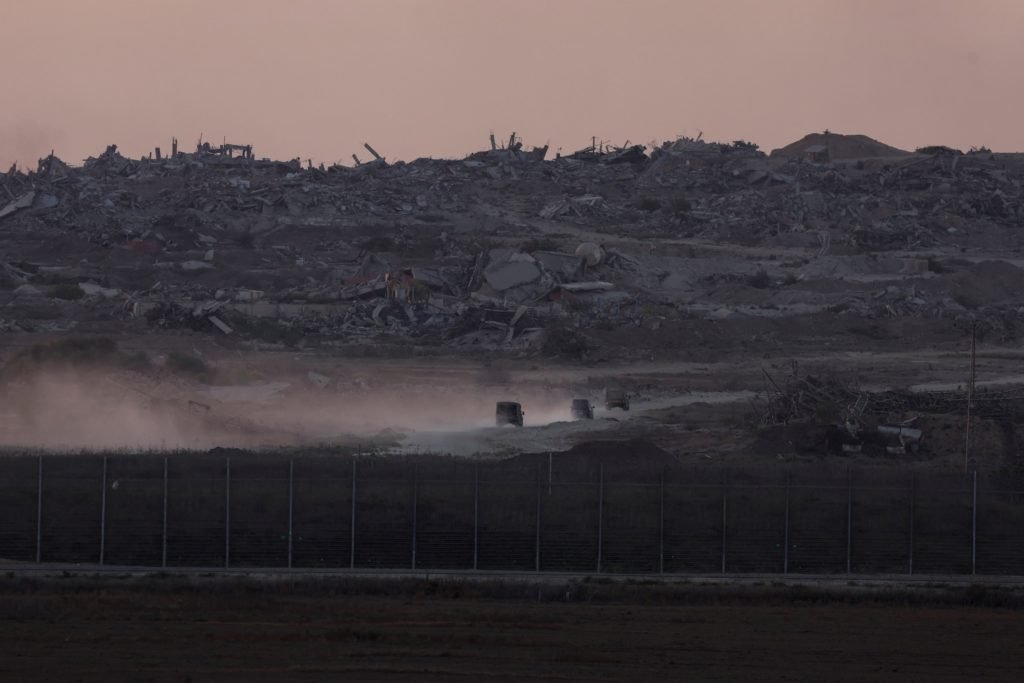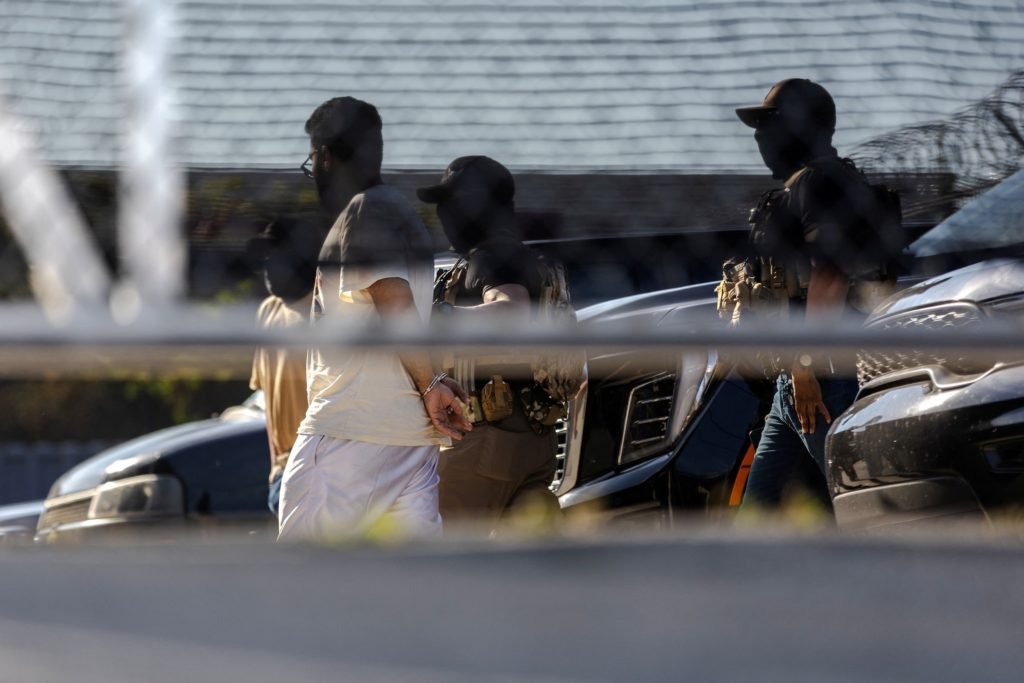Amna Nawaz:
Today, Israeli troops pushed deeper into Gaza City, part of an operation Israel says is designed to seize Gaza’s largest city and defeat Hamas. Dozens more Palestinians were killed today in Israeli attacks. Health officials in Gaza announced earlier today that more than 65,000 Palestinians have now been killed in nearly two years of war.
And a coalition of leading aid groups urged the international community to take stronger measures to stop the offensive after a commission of U.N. experts accused Israel of committing genocide.
Here’s Nick Schifrin with more.
Nick Schifrin:
An independent international commission attached to the U.N.’s Human Rights Council released its report this week that accuses Israel of an ongoing genocide against Palestinians in Gaza.
The U.N.’s Genocide Convention defines genocide as acts committed with intent to destroy, in whole or in part, a national ethnic, racial or religious group, and cites as examples killing, injuring, inflicting conditions calculated to bring about physical destruction, preventing births or transferring children.
The commission accuses Israel of committing at least four of those five acts, and that statements made by Israeli authorities are — quote — “direct evidence” of genocidal intent.
Then-Defense Minister Yoav Gallant, here on October 9, 2023:
Yoav Gallant, Former Israeli Defense Minister (through interpreter):
We are ordering a complete siege on Gaza, no electricity, no food, no water, no fuel. Everything is closed. We are fighting human animals, and we are acting accordingly.
Nick Schifrin:
To discuss the report, I first turn to Craig Mokhiber. He’s an international human rights lawyer and former senior U.N. official, and he joins me now from New York.
Craig Mokhiber, thanks very much. Welcome to the “News Hour.”
This charge of genocide has been made before. How is this report different than previous documents that made this accusation? And why is this significant?
Craig Mokhiber, Former Senior U.N. Official:
Well, this report is the report — is the result of two years of internationally mandated investigations, 80 pages of detailed facts and legal analysis, and all conducted by a panel of very highly qualified, highly respected international human rights experts and jurists.
And, of course, it follows up on earlier findings of genocide by the U.N. special rapporteur. Virtually the entire community of international human rights lawyers, we have never seen a consensus as clear as this one, and now this additional report on top of that, a very serious, officially mandated report, I think is the final piece in the puzzle of accountability that people have been trying to build for two years of genocide.
Nick Schifrin:
Israel, of course, denies that it’s committing genocide. If anything, it blames Hamas on committing genocide, stating Hamas’ charter.
And let’s talk about intent, which, of course, is what makes genocide legally unique, but also very difficult to prove. Israeli officials have disputed the argument in this report that senior officials’ statement somehow prove intent. The Israeli argument is that some of those statements were taken out of context and that they are made by politicians, not the executors of the military campaign, and the people who are executing the military campaign are inside the IDF and they follow international humanitarian law.
What’s your response to that argument?
Craig Mokhiber:
Well, that’s not a very convincing argument. In fact, it’s an unusual argument.
Normally, the argument that is made is, well, those people who made those statements are marginal characters. In this case, we’re talking about the president, the prime minister, at least seven members of the Israeli Cabinet, senior military commanders, commanders on the ground, and all the way down the chain of command.
And what the commission has shown and others before them have shown is that these statements are made, they are then repeated down the chain of command, and, in fact, they are perpetrated on the ground with a genocidal fury that is undeniable.
They looked at every aspect of the situation on the ground to align the facts with the statements and to conclude that, indeed, the intent is genocide and the acts are genocide.
Nick Schifrin:
Intent can also be proven by a pattern of conduct on the ground. And, in fact, Israel points at what Hamas is doing inside Gaza and says the report does not take into account how Hamas fights, using hospitals as bases, which I have personally witnessed in Gaza, and fighting from tunnels underneath civilian infrastructure.
Doesn’t the circumstance of this war change the assessment of Israel’s conduct?
Craig Mokhiber:
It does not.
Even if the premise were true, which has often proven not to be true, but let’s say that a combatant is alleged to be in a hospital or surrounded by civilians in a refugee shelter. That does not relieve the responsibility of Israel to respect international law. They are still bound by the principles of precaution and distinction and proportionality, respect for protected persons.
The systematic targeting of virtually every hospital in Gaza, the targeting of schools and churches and mosques and refugee shelters and community facilities, of aid warehouses and aid distribution points, there is no way that they can justify this either legally or in fact by simply using the magic word Hamas or the magic word terrorist. That does not have that effect in international law.
Nick Schifrin:
And, finally, the commission today accuses Israel of intentionally using starvation as a method of warfare. But Israel argues it has allowed two million tons of aid into the Gaza Strip, over one ton of aid per person, and that it’s Hamas who’s actually stealing the aid in order to pay its fighters.
Craig Mokhiber:
If it is true that aid is being allowed in, which is denied by all those responsible for distributing aid, except for the Israelis and their mechanisms themselves, somehow people are still starving to death, and somehow we had last month a declaration of famine in Gaza.
There is famine in Gaza. People are starving to death. And that is the result of the intentional policies of the Israeli regime.
Nick Schifrin:
Craig Mokhiber, thank you very much.
Craig Mokhiber:
Thank you for having me.
Nick Schifrin:
And for the other perspective, I spoke earlier today to Dr. Eran Shamir-Borer, director of the Israel Democracy Institute’s Center for Security and Democracy and the former head of the Israel Defense Forces’ International Law Department. He was also a member of Israel’s defense team at the International Court of Justice.
Eran Shamir-Borer Iran, thanks very much. Welcome to the “News Hour.”
As we have been discussing, the Genocide Convention lists a series of acts that must be committed — quote — “with the intent to destroy in whole or in part a national ethnic, racial or religious group.”
The report says that Israel’s intent is proven through statements, then-Defense Minister Yoav Gallant saying Israel was — quote — “fighting human animals,” President Isaac Herzog saying the entire Palestinian nation was responsible and others.
Do those statements not prove the intent to destroy?
Dr. Eran Shamir-Borer, Center for Security and Democracy Director, Israel Democracy Institute: I think the report is wrong about the law, is wrong about the facts, and also wrong about the methodology.
So,first and foremost, these statements are — it’s like an effort of cherry-picking very selective quotations, completely ignoring the context or many, many other statements by the same individuals. And also they fail to remind that the IDF is not operating, is not conducting itself based on statements of this or other politician.
But it’s a very disciplined military operating under very clear and written decisions of Israeli War Cabinet, basing its operational decisions on standing operating procedures and rules of engagement. And this or that statements, even though some of them I think are highly regrettable, some of them even reprehensible statements, I would say, but that’s not the way that the military in democracies, including in Israel, operate.
It’s just not the way that the militaries function.
Nick Schifrin:
Intent can also be established by a pattern of conduct on the ground. And the report argues the IDF has conducted indiscriminate bombing. The U.N. says 78 percent of Gaza’s structures have been damaged or destroyed.
Is that not proof of the intent to destroy?
Dr. Eran Shamir-Borer:
First of all, because, when assessing the legality of the conduct of militaries, you need information about what were the operational justifications for a specific account or a specific decision to destruct, for instance, the specific facility.
And the committee, they had no access to this information. They only rely on information released by Hamas itself. And when you look into specific incidents, they only rely on very partial data. They never mention what was the target of this strike.
For instance, they refer in one of the incidents they mention to an attack on the European Hospital, as they mentioned. Now, Israel already released extensive information that it wasn’t taking the hospital. It was actually attacking — the target was actually military infrastructure underneath the hospital.
Mohammed Sinwar, no less than the head of Hamas, died as a result of this attack. He was the target of the attack. The report simply fails to mention any of this and trying to depict the reality as if Israel is just purposefully attacking a medical facility. That’s totally not the case.
You can’t assess the legality of Israeli actions without actually also assessing Hamas’ conduct. And this is the conduct of the terror organizations that carries out attacks against Israeli civilians, that booby-traps its own military — its own civilian infrastructure, that shields itself with its own civilians, and built, dug a very extensive tunnel, tunnels underneath Gaza.
And I think that’s — it’s outrageous. It’s unprofessional. And it also attests, I think, to the partiality and bias of the committee.
Nick Schifrin:
The report makes a separate legal argument that Israel has blocked humanitarian aid. There was a time when Israel allowed zero trucks in. Israel this week has announced additional steps to try and let trucks in, but humanitarian officials in the region tell us even today that the number of trucks getting in is no more than 100. That is one-sixth the number that the U.N. says is necessary to feed Gaza.
So has Israel not blocked humanitarian aid from going into Gaza?
Dr. Eran Shamir-Borer:
For a very long time, for over a year-and-a-half, Israel allowed and facilitate any aid to go into Gaza.
It’s true that, after the cease-fire, when there was a huge story, a supply of aid inside Gaza, then Israel halted the aid for a while. But, again, the report totally ignores the reality in which Hamas simply steals significant portions of this aid, commandeering some of the aid going in and, in this way, actually, sustaining its war effort against Israel.
Nick Schifrin:
Eran Shamir-Borer, thank you very much.
Dr. Eran Shamir-Borer:
Thank you very much, Nick.




